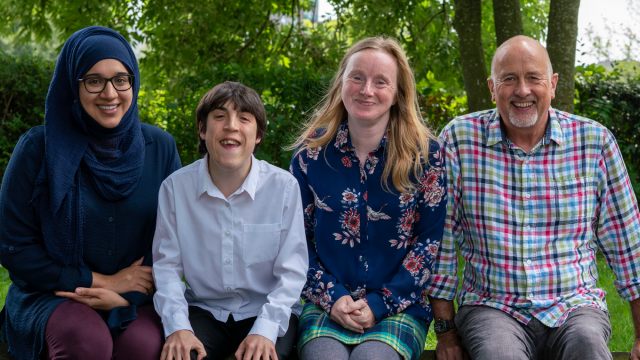See your support in action in our BBC Lifeline Appeal
On Sunday 21st November SeeAbility featured in the BBC’s Lifeline Appeal! We hope the film strikes a chord with like-minded people, who are equally passionate about supporting our work and encouraging people with disabilities to challenge what they expect from life, from themselves and from wider society.
The aim of the film is to create understanding and break down the prejudices that keep people apart and perpetuate social exclusion – we hope you like it.
Thank you so much to Connor, Beatrix and Kiyana and her family for sharing their stories. Watch on BBC iPlayer to see how their lives have been transformed through our support.
 Kiyana
Kiyana
Kiyana is a lively, fun-loving little girl who, thanks to SeeAbility, can now see her mother and the world more clearly.
Like many children with Down’s syndrome, Kiyana is long-sighted and needs to wear glasses. Regular frames didn’t fit at her temples and constantly slipped off her face. But SeeAbility’s dispensing optician found a lightweight frame with an adjustable bridge that fits perfectly on her nose.
Thanks to her specially-fitted glasses Kiyana can finally live the active life that means so much to her. Her mum, Dee says that she’s a different girl and is so much more confident now. You'll find her in the gym crawling down a tunnel, playing ping-pong with her friends or jumping around on the trampoline. In short, she's able to muck around in the way any child should.
 Connor
Connor
Connor lived at home until he was 16 and then went to a residential college where he found it difficult to settle in. Shortly after, Connor moved into SeeAbility’s residential home in Somerset.
Connor has a brilliant sense of humour, loves car meets, has cerebral palsy, is a wheelchair user and has a learning disability. He found it a challenge to live in a residential home because it reminded him that he is disabled. Connor wants what we all want, to be independent and living his own life, so the SeeAbility team supported him with his application for his own flat.
Now Connor has achieved his dream of living independently and is busy making friends and doing the things he enjoys. With support from SeeAbility in his own home, he attends car meets at the local Banger Racing venue, where one day he hopes to find a job.
 Beatrix
Beatrix
Beatrix had been ready to work since she left school. She tried for seven years to find employment through her local Job Centre, but despite her drive and willingness, she didn’t succeed. That’s when SeeAbility’s supported employment programme Ready, Willing and Able stepped in.
Joining our programme in May 2021, Beatrix who has a learning disability, began working with her own supported employment coach to help her develop her skills and prepare for work. Together they then looked to find employment opportunities, all the while working on her interview technique.
In June, Beatrix secured an interview to work as a waitress at an award-winning restaurant in Bristol. In response to her cheery personality and her hard work with her Ready, Willing and Able coach, Beatrix was offered the job, bringing her seven-year search to an end.
 Helen Fospero, BBC presenter and SeeAbility Patron, is presenting our Appeal:
Helen Fospero, BBC presenter and SeeAbility Patron, is presenting our Appeal:
I became involved with SeeAbility in 2019 when I joined my friend Amar Latif and 20 other adventurers on a fundraising trek to the summit of Mount Toubkal in Morocco.
Our group was a mix of people with lived experience of learning disabilities and sight loss and those of us who were privileged to guide them. We spent 9 days working together and overcoming barriers to reach the summit and I was struck by the resilience of my fellow trekkers with disabilities and how their determination must have come from having to overcome barriers every day.
Shortly after the trek I visited one of SeeAbility’s homes, Heather House, and was inspired by the dedication of the team there to ensure that people with disabilities lead fulfilling lives and achieve their goals.
I share SeeAbility’s passion to create opportunities for everyone to feel included in their communities. It’s time that we break down the barriers in society and challenge assumptions about what people with disabilities can and can’t do.



